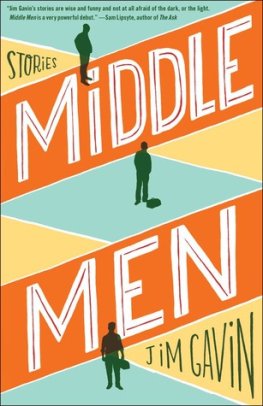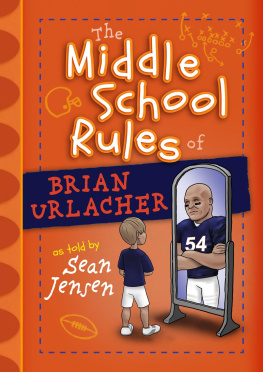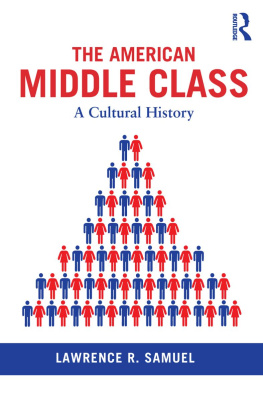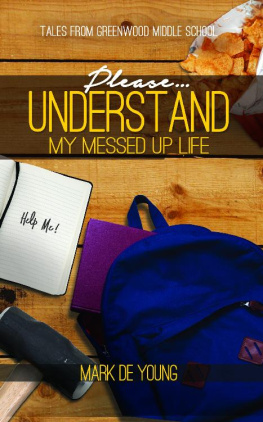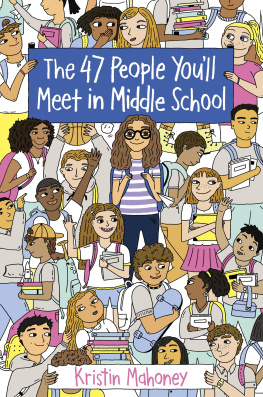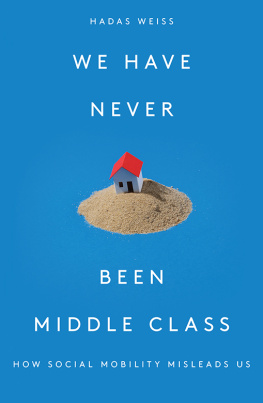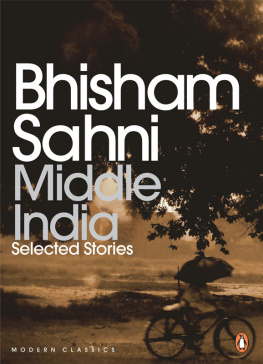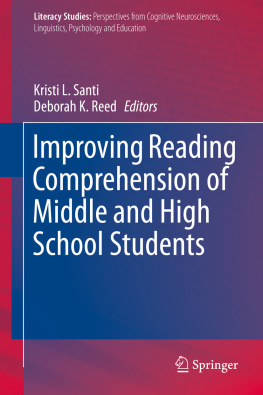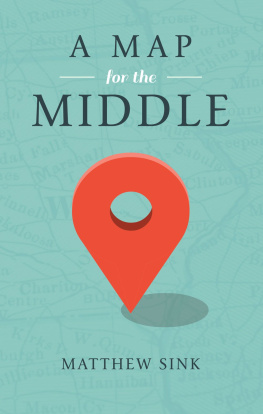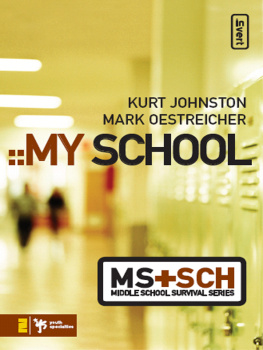Jim Gavin
Middle Men: Stories
In memory of Barbara Gavin
Every life is many days, day after day. We walk through ourselves, meeting robbers, ghosts, giants, old men, young men, wives, widows, brothers-in-love, but always meeting ourselves.
James Joyce, Ulysses
The Romans had a hard time killing Polycarp of Smyrna. In the stadium, surrounded by bloodthirsty pagans, he heard a voice. Be strong, Polycarp, the voice said, and play the man. The good bishop smiled calmly at his persecutors. They tried to set him on fire, but his flesh would not be consumed. They pierced his heart with a sword, but a dove issued from his chest. The afternoon dragged on like that, miracle after miracle, until they finally cut off his balls, or fed him to the Sarlacc pit monster, or whatever. Im not a theologian, so I dont know all the facts, but eventually Christian artisans painted those divine words, Play the man, on the gym wall of St. Polycarp High School in Long Beach.
On the first day of summer practice, Coach Boyd gathered us at center circle. I was going to be a junior and had just transferred from Trinity Prep, a bigger and better Catholic school in Orange County. St. Polycarp had one-third the enrollment, and it was all boys. I didnt know anybody yet, but according to my racial calculus seven white, four black, one Asian I would go straight into the starting lineup. It was 1992. Our shorts were getting baggy and Magic had AIDS.
This is Pat Linehan, said Coach Boyd, putting a hand on my shoulder. Were lucky to have him.
Trinity had the best basketball program in the state; I expected everyone to be impressed by my pedigree, but nobody seemed to care. Coach Boyd pointed to the fading mural of St. Polycarp.
Thats sort of our motto, he told me. Play the man.
Do you mean man-to-man defense? said a tall white kid with bad acne and luxurious eyebrows.
You know what I mean, said Coach Boyd.
Because we play zone.
I know we play zone, Tully. Dont start with me.
Earlier, when I first walked into the gym, one of the black kids, Greg Overton, told me that I looked just like Dustin Tully. He was right, except I also had braces, which shouldve come off a while ago, but my dad had lost his job, and our dental plan, and now I was stuck with them.
Coach Boyd was barefoot. I found this troubling. Authority figures usually wore shoes. At the time, with his thinning blond hair and mustache, he seemed like an old man, but he was probably in his early thirties. Now, listen, said Coach Boyd. This summer well be taking a journey together.
You mean the tournament in Ventura? said Tully.
No, said Coach Boyd.
So were not going to Ventura? said Tully.
We are going to Ventura, but thats not the kind of journey Im talking about. Just listen for a second.
Do you mean a spiritual journey? said Tully.
Yeah, but if you say it like that, it sounds stupid.
Since we play zone, said Tully, maybe our motto should be Play the zone.
Do you want to run? said Coach Boyd. Because we can run all day.
Polycarp was schizophrenic, said Tully. All the saints were.
Baseline, said Coach Boyd, and we spent the next hour running suicides.
For extra money my dad used to ref summer league games. As a result, I was lucky enough to grow up in gyms all over Southern California. At halftime Id run down to the court with a ball, showing off my handle, my range. Even then I was a vain little shit. I imagined the bleachers full of college scouts, but the bleachers were usually empty. Summer league was a languid affair. Players yawned in the layup lines as their coaches sipped Big Gulps. In 1983, when I was seven, my dad worked a tournament at Cal State Dominguez Hills. The first game of the afternoon featured Crenshaw High, the L.A. city league powerhouse. They had John Williams, the John Williams, seventeen and already a legend. He walked in the gym and instead of warming up, he took a nap on the bleachers. I could hear him snoring. My dad blew the whistle for tip-off and one of his teammates woke him up. He walked to center court, still rubbing sleep from his eyes. Early on he got the ball on the right wing, drifted lazily to the baseline, then spun back, hard, into traffic, splitting two defenders, and though he couldve dunked, he chose, with impeccable taste, to finish with a reverse layup. The beatific vision you catch a glimpse and spend your whole life chasing it. At my next YMCA game, I tried to skip warm-ups and take a nap, but my dad yanked me up and threw me back among the mortals.
When I got older, he used to drive me around Long Beach, looking for pickup games. If he drove by a park and didnt see a sufficient number of black guys whod kick my ass, hed keep going. His strategy almost paid off, because in eighth grade, after playing well in an AAU tournament, I was approached by a shadowy recruiter from Trinity a friend of the school, he called himself who said I would be a nice addition to the basketball program. My parents, wanting to vouchsafe my future, agreed to take on the higher tuition and longer commute. When I got to Trinity, the coaches described me as heady and deceptively quick, both of which meant I was white. Apparently, I was using my superior Western European intellect to cross over fools and get to the basket. Somehow this didnt transfer to the classroom. In ninth grade, I flunked algebra. A counselor suggested I might have a tragic condition called math anxiety.
My brain was average and so was my body. The coaches who liked my game kept asking when I was going to fill out. I was six-foot and scrawny, with a weird concave chest that was a major source of shame. After playing JV my sophomore year, starting about half our games, I expected to move up, but several transfers arrived from exotic places like Westchester and Fontana and they were all seriously filled out. One kid was featured in a Sports Illustrated article as the best fifteen-year-old in the nation. At some point, Ted Washburn, the varsity head coach, called me into his office. He was a big man, with jowls, and in his Nike tracksuit, he exuded the portly air of a Renaissance king. After zero small talk he advised me to transfer so I could get some playing time. I vowed to fight for my place. I like you, Pat, he said. But you dont have a place here.
Coach Boyd finally told us to get water. As we drank from the porcelain fountain, sucking its leaden bounty, he conferred privately with Tully and then called us back to center circle. I dont want to be an asshole, he said. I had plenty of asshole coaches and I dont want to be like that. All I ask for is your respect.
Thats when I started to lose respect for Coach Boyd. I thought wed go into drills, but instead we divided up for a scrimmage. Chris Pham, the starting point guard, wore Rec Specs. He couldnt go left and every time he tried to change direction, I ripped his ball. I got down low and barked in his face, the way I had been taught. My rabid defensive posture amused my new teammates; they all sat back in a listless zone, waiting for something to happen. Tully was the tallest guy on the team, but he liked to hang around the three-point line. Overton and another black kid, Devaughn Weaver, swatted me a couple times, but otherwise I carved up their zone, either finishing or passing to someone with bad hands and no imagination.
After practice Tully asked why I had transferred. Anticipating this question, I had prepared a lie. I got in a fight with a coach, I said.
Did he try and rape you or something?
No.
So the sex was consensual?
Dont listen to him, said Overton, laughing and pushing Tully out of the way.
Weaver asked about some of Trinitys players, guys with big local reps who were going to Pac-10 schools. I lied again, saying that before I left, I was also getting recruited.

